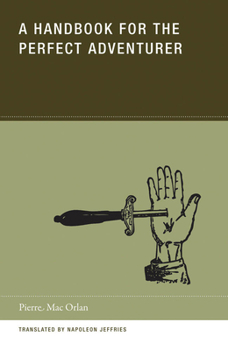A Handbook for the Perfect Adventurer
A how-to manual for the armchair adventurer
Pierre Mac Orlan's 1920 Handbook for the Perfect Adventurer was at once a paean to the adventure story, a tongue-in-cheek guidebook to the genre's real-life practitioners and a grim if unspoken coda to the disasters of World War I. "It must be established as a law that adventure in itself does not exist," Mac Orlan stipulates. "Adventure is in the mind of the one who pursues it, and no sooner is he able to touch it with his finger than it vanishes, to reappear much farther off in another form, at the limits of the imagination." This handbook outlines two classes of adventurer: the active adventurer (sailors, soldiers, criminals) and the passive adventurer (sedentary parasites who draw sustenance from the exploits of the former). Roaming from battlefields to pirate ships to port-town taverns, and offering advice on reading, traveling and eroticism, Mac Orlan's Handbook is ultimately a how-to manual for the imagination, and a formulation of the stark choice all would-be adventurers must face: to live or write. Generally known as the author of Le Quai des brumes (the basis for Marcel Carn?'s film of the same name), Pierre Mac Orlan (1882-1970) was a prolific writer of absurdist tales, adventure novels, flagellation erotica and essays, as well as the composer of a trove of songs made famous by the likes of Juliette Gr?co. A member of both the Acad?mie Goncourt and the Coll?ge de 'Pataphysique, Mac Orlan was admired by everyone from Raymond Queneau and Boris Vian to Andr? Malraux and Guy Debord.Format:Paperback
Language:English
ISBN:1939663008
ISBN13:9781939663009
Release Date:January 1
Publisher:Wakefield Press
Length:104 Pages
Weight:0.35 lbs.
Dimensions:0.4" x 4.4" x 6.9"
Customer Reviews
0 rating





